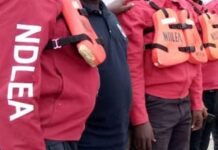At least 2,122 people associated with Boko Haram have left the group since Abubakar Shekau, long-time leader of its faction, Jama’atu Ahlis Sunnah lid-Da’wati wa’l-Jihad (JAS), died in May this year.
Understanding why members leave Boko Haram is important – it provides authorities with information that can be used to counter terrorism in the area, the South Africa-based Institute for Security Studies (ISS) reported on Thursday.
ISS said it is largely two categories of people associated with JAS who are leaving. The first is civilians who couldn’t move away from areas under Shekau’s control while he was alive for fear of ruthless reprisals. The second category is fighters, high-ranking commanders and their families.
According to ISS, large-scale desertions from Boko Haram have occurred before, when notable events presented opportunities for people to leave the group.
Sustained actions by Nigeria’s military in 2014 and the major Multinational Joint Task Force-led operation against Boko Haram weeks before the country’s general elections in 2015 resulted in many members leaving.
The biggest wave of withdrawals was triggered by the 2016 intra-group rivalry that culminated in Boko Haram splitting into two factions – JAS and the Islamic State West Africa Province (ISWAP).
Extensive counter-insurgency messaging by the government in that year also played a role. During this period, 800 Boko Haram associates surrendered to the government in three weeks. By the end of 2016, over 1,000 had left the group in Nigeria.
Events since May show that the absence of leadership can severely damage Boko Haram.
The recent departures occurred mainly in Nigeria, specifically Borno State. Combatants and affiliates are also surrendering to authorities in Cameroon, as some communities are close to the border between the two countries. People are leaving villages in and around Sambisa and other local government areas where JAS was known to operate.
ISS research shows that people turned away from Boko Haram between 2015 and 2020 because of military operations against the group, poor living conditions for members, disillusionment and misalignment of objectives. There were at least 4,227 desertions from Boko Haram in the Lake Chad Basin up to 2020.
However, disengagement isn’t occurring in Niger or Chad. JAS’s Bakura Doro sub-unit operating on the Lake Chad islands covering those axes is intact. It’s also insulated from intergroup clashes and ISWAP’s power grab that is happening in and around Sambisa – a move that is also fuelling desertions, according to ISS research.
Two primary reasons account for the mass departures. First, ISWAP is allowing civilians who do not want to be part of the group to leave. These were people who JAS, under Shekau, had kept against their will, using them as forced, unpaid labour and human shields. Those who tried to leave and were caught were severely punished, and in some cases, executed.
Some fighters leave without disassociating from the group, or denouncing Boko Haram’s ideology
Second, some JAS fighters who don’t want to join ISWAP are fleeing for their safety.
As ISWAP tightens its monopoly on violent extremist operations in the Lake Chad Basin, it has demoted some JAS commanders, replacing them with its own younger leaders from the Lake Chad islands.
Some JAS commanders were ousted because of their links to armed robbery, cattle rustling and kidnapping, and ISWAP doesn’t want them in positions of authority, sources say.
This has resulted in some disquiet in Sambisa. The ousted commanders are urging their combatants to protest against the injustice of Shekau’s death. Having been marked for arrest and possible execution, and realising they cannot defeat ISWAP in battle, these disaffected JAS members have just two choices. They can surrender to the military or risk the long journey to the Lake Chad islands area where new JAS leaders Bakura Doro and Bakura Sa’alaba are based.
Some JAS fighters who have tried to move from Sambisa to the Lake Chad islands have been blocked by ISWAP in Kumshe, in Borno State’s Bama local government area. Those who surrender to government authorities have done so discreetly to avoid ISWAP attacks.
Events since May show the security forces that the absence of leadership can severely damage Boko Haram. To further weaken the group, particularly ISWAP, military operations should target those in command of the extremist group. This could trigger more disengagements from ISWAP, further weakening Boko Haram as a whole.
Members’ reasons for deserting are as different as their roles in the group. Fighters leave without actually disassociating from the group or denouncing Boko Haram’s ideology. Surrendering to government forces just gives them a better chance of survival than the certain death of confronting ISWAP.
Nigerian security forces’ improved conduct and public image could also contribute to fighters surrendering to them, as they’re reportedly being treated humanely. Authorities can make the most of this as they try to end the decade-long crisis.
ISS researchers suggest that governments in the Lake Chad Basin region should use the ongoing departures to cripple the violent extremist group.
Governments should also follow judicial and rehabilitation processes in dealing with former fighters and their dependents. This might encourage further desertions, counter recidivism, improve intelligence gathering and prevent former combatants from reintegrating into communities far from the Lake Chad Basin.
Programmes for those who leave violent extremist groups cannot be generic. They must be tailored to the needs of the groups and individuals, including women and children, who make up the majority of the departures.
Countries must be prepared, however, as the current waves of desertions could strain the capacity of transit and rehabilitation centres, especially the Meri transit camp in Cameroon. Lake Chad Basin governments need to urgently bolster their technical, material and operational capacities to be ready for this. (PANA/NAN)




